牛津版初二上册英语4-6单元语法点及习题.
沪教牛津版八年级上册英语教材
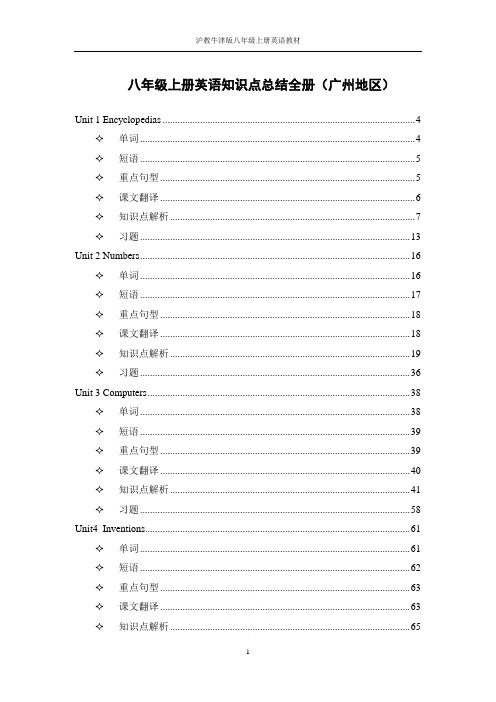
八年级上册英语知识点总结全册(广州地区)Unit 1 Encyclopedias (4)✧单词 (4)✧短语 (5)✧重点句型 (5)✧课文翻译 (6)✧知识点解析 (7)✧习题 (13)Unit 2 Numbers (16)✧单词 (16)✧短语 (17)✧重点句型 (18)✧课文翻译 (18)✧知识点解析 (19)✧习题 (36)Unit 3 Computers (38)✧单词 (38)✧短语 (39)✧重点句型 (39)✧课文翻译 (40)✧知识点解析 (41)✧习题 (58)Unit4 Inventions (61)✧单词 (61)✧短语 (62)✧重点句型 (63)✧课文翻译 (63)✧知识点解析 (65)✧习题 (68)Unit5 Educational exchange (71)✧单词 (71)✧短语 (72)✧重点句型 (72)✧课文翻译 (73)✧知识点解析 (74)✧习题 (83)Unit 6 Ancient stories (85)✧单词 (85)✧短语 (87)✧重点句型 (87)✧课文翻译 (88)✧知识点解析 (89)✧习题 (95)Unit 7 Memory (100)✧单词 (100)✧短语 (101)✧重点句型 (101)✧课文翻译 (102)✧知识点解析 (103)✧习题 (109)Unit 8 English Week (114)✧单词 (114)✧短语 (115)✧重点句型 (115)✧课文翻译 (116)✧知识点解析 (117)✧习题 (122)每单元必考语法点预览Unit 1 some与any的用法& 复合不定代词somebody, anybody, nobody等的用法Unit 2基数词及数字的表达& 序数词Unit 3形容词的比较级与最高级Unit 4 good, bad, far & (not) as…as…Unit 5现在完成时& already, yet, ever, neverUnit 6 现在完成时中since, for & 现在完成时与一般过去时的区别Unit 7(真实性)条件状语从句& if…not 与unlessUnit 8情态动词should, had betterUnit 1 Encyclopedias 单词suddenly adv. [ˈsʌdn:lɪ] 意外地,忽然地nobody pron. [ˈnoˌ bədi] 没有人,无人fossil n. [ˈfɑsəl] 化石win v [wɪn] 获胜,赢dollar n [ˈdɑlɚ] 美元✧短语1.in the countryside 在乡村,在农村11.for example 例如2.human being 人12.next to 紧挨着3.die out 灭绝,消失13.look up 查阅4.find out 了解,弄清14.live on Earth 生活在地球上5.go for a walk 去散步15.an Italian painter 一位意大利画家6.be born 出生ed to do sth 过去常常做某事7.more than 多于,超过17.at the end of 在…末尾8.just like 正如,正像18.in the centre 在中心9.how long 多久e out of…从…出来10.would like 想要20.be famous for 以…而闻名✧重点句型1.Some dinosaurs were as small as chickens. 有的恐龙和鸡一样小。
最全面牛津版八年级上册英语各单元知识点总复习归纳总结

最全面牛津版八年级上册英语各单元知识点总复习归纳总结1. Unit 1: Greetings and Introductions- Present simple tense- Questions with "what" and "where"2. Unit 2: School Life- Describing school subjects- Using adjectives to describe teachers and classmates- Asking and answering questions about school routines3. Unit 3: Hobbies- Vocabulary related to hobbies and interests- Expressing likes and dislikes- Present continuous tense4. Unit 4: Food and Health- Food vocabulary and describing preferences- Expressing opinions on healthy eating habits- Imperative sentences for giving suggestions and instructions5. Unit 5: Holidays and Traditions- Vocabulary related to holidays and celebrations- Describing past events- Using time expressions and prepositions to talk about when and where6. Unit 6: Environment- Vocabulary related to environmental issues- Expressing concerns and suggestions for protecting the environment- Present perfect tense to talk about experiences7. Unit 7: Jobs and Career Choices- Vocabulary related to different professions- Talking about future plans and aspirations- Using "will" and "going to" for future predictions and intentions- Expressing opinions on advantages and disadvantages of technology- Present perfect continuous tense这份文档总结了八年级上册牛津版英语教材各单元的知识点。
牛津译林版八年级上册 知识点+同步练习(带答案)
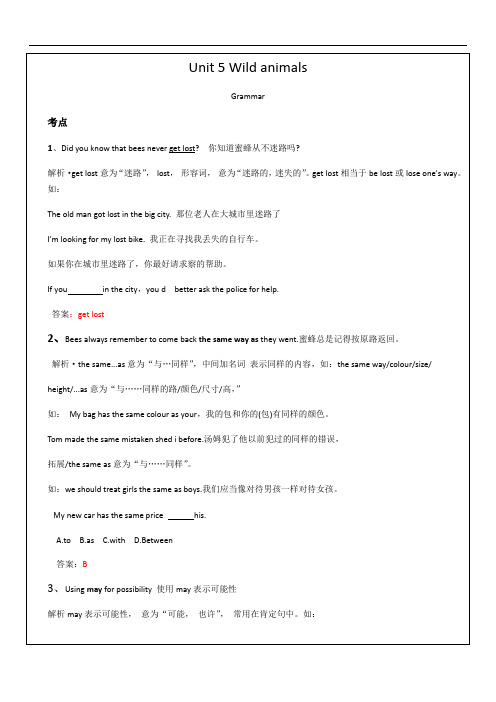
8.(not go) near the tigers!They may hurt you.o15daoM To
9.Would you please(protect) our forests by doing little things?
He doesn't know what to do next.他不知道下一步做什么。
1 .-Do you have any places for the coming vacation? Sure.We decideFrance in July.
A.visit B.visiting C.visited D.to visit
10.At the(begin) of the concert,Tan Dun played a piece of music with water.
三、单项选择。
( ) 1.一Daniel,do you know that bees never get lost?
一Yes.Bees always rememberthe same way as they went.
4.This book is much(厚) than that one.I'll take that one.
5.The(失去) of living areas makes tigers have nowhere to live.
6.People sometimes(猎杀) tigers for their fur.
No,you mustn't.不,你不可以。
1.一Will Anna go to the movies with us tonight?-Shego,but I'm not sure.
牛津英语八年级上8A4—6单元重点短语和句型回顾
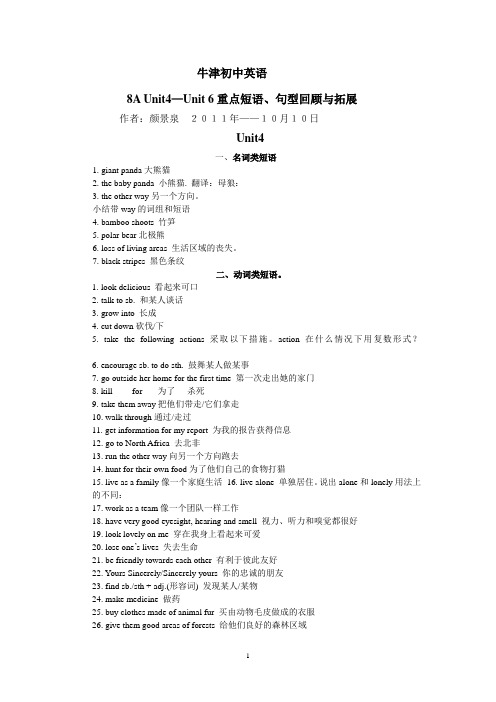
牛津初中英语8A Unit4—Unit 6重点短语、句型回顾与拓展作者:颜景泉2011年——10月10日Unit4一、名词类短语1. giant panda大熊猫2. the baby panda 小熊猫. 翻译:母狼:____________3. the other way另一个方向。
小结带way的词组和短语___________________________________________4. bamboo shoots 竹笋5. polar bear北极熊6. loss of living areas 生活区域的丧失。
7. black stripes 黑色条纹二、动词类短语。
1. look delic ious 看起来可口2. talk to sb. 和某人谈话3. grow into 长成4. cut down砍伐/下5. take the following actions 采取以下措施。
action在什么情况下用复数形式?_________________________________________________6. encourage sb. to do sth. 鼓舞某人做某事7. go outside her home for the first time 第一次走出她的家门8. kill --- for --- 为了----杀死----9. take them away把他们带走/它们拿走10. walk through通过/走过11. get information for my report 为我的报告获得信息12. go to North Africa 去北非13. run the other way向另一个方向跑去14. hunt for their own food为了他们自己的食物打猎15. live as a family像一个家庭生活16. live alone 单独居住。
牛津译林版八年级英语上册Unit 4全章知识点练习汇总
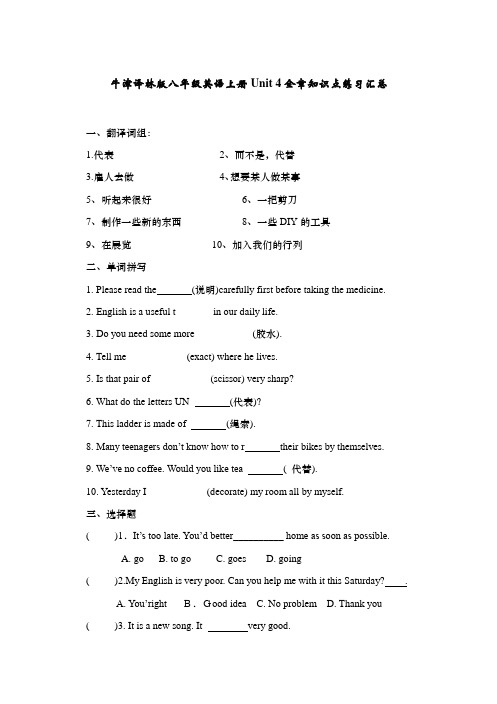
牛津译林版八年级英语上册Unit 4全章知识点练习汇总一、翻译词组:1.代表_____________________2、而不是,代替_______________________ 3.雇人去做_____________ 4、想要某人做某事______________________ 5、听起来很好________________ 6、一把剪刀______________________ 7、制作一些新的东西__________ 8、一些DIY的工具______________9、在展览________________10、加入我们的行列___________________二、单词拼写1. Please read the (说明)carefully first before taking the medicine.2. English is a useful t _______in our daily life.3. Do you need some more___________ (胶水).4. Tell me____________(exact) where he lives.5. Is that pair of____________(scissor) very sharp?6. What do the letters UN (代表)?7. This ladder is made of (绳索).8. Many teenagers don’t know how to r their bikes by themselves.9. We’ve no coffee. Would you like tea ( 代替).10. Yesterday I____________(decorate) my room all by myself.三、选择题( )1.It’s too late. You’d better__________ home as soon as possible.A. goB. to goC. goesD. going( )2.My English is very poor. Can you help me with it this Saturday? .A. You’right B.Good idea C. No problem D. Thank you ( )3. It is a new song. It very good.A. soundsB. tastesC. looksD. turns( ) 4. We would like to go to the cinema watching TV at home.A. because ofB. pay attention toC. instead ofD. look after.( ) 5. Danny, come here. I have to tell you.A. something newB. new somethingC. anything newD. new anything. ( )6.There _________ a pair of scissors and two pairs of shoes on the f loor.A.isB.areC. haveD. has( )7.Can you show _______ how ____________ paper roses?A. I, makeB.me ,makin gC.me, to makeD. I ,to make ( )8.-- Liu Tao plays ____ computer games at weekends. --Yes, he plays ___.A. too many, too muchB.too much, too manyC. too many, too manyD.too much, too much ( )9.--Must I hand in my homework now?---Yes, you _______.A. needB. mustC. mayD.can三、用所给词的适当形式填空1.Read the _________________(说明,指示) first before you use the computer.2. Please pass me the __________ (胶水)and ______________(剪刀).3. I ___________(确切地) know how she feels now, she is very sad.4. The chair is broken, but I can r_________ it with some___________(工具).5. He is an artist, he has many b____________.6. This idea sounds__________ (love).Why not _________(try) it?7. A pair of scissors _________( not , be) enough for us.8. You look tired. You’d better __________ (stop ) __________ (have) a rest.9.What’s the ______(mean) of the word? =What does the word ______(mean)?10.Both of _________ (they) have lunch at school.11.Good _______(luck) to you! I am _______(luck) to pass the difficult exam.12. The long talk made me __________(bore).13.Many foreign friends are very _____ in__________places in China.(interest)14.We can’t be the______(win) without the ___________support.(support)15.We don’t want these red pencils .I want those green ____________(one).三、翻译句子1.你最好不要和狗玩。
牛津译林版八年级上册全册语法知识点复习总结

牛津译林版八年级上册全册语法知识点复习总结一、形容词的比较级和最高级1. 形容词的比较级用于两个人或事物之间的比较,其结构如下:主语+谓语动词(系动词)+形容词比较级+than+比较对象。
2. 形容词最高级的由用法:形容词最高级用于三者或三者以上的人或物进行比较,其结构为:主语+谓语动词(系动词)+the+形容词最高级+名词+表示范围的短语或从句。
3. 形容词的比较级和最高级是在形容词原级的基础上变化的,分为规则变化和不规则变化。
①规则变化①不规则变化二、比较事物的数量1. 两者之间比较通常用more..than/ less... than 和fewer..than来比较两种事物之间的数量关系。
其中more... than之间加可数名间的复数形式或者不可数名词,less... than 之间加不可数名词,fewer...than 之间加可数名词的复数形式。
例:I has more apples than Lily.我的苹果比莉莉的多。
He eats less food than I for breakfast.他早饭比我吃得少。
Bobby has fewer books than Tim.波比的书比蒂姆的少。
2. 三者或三者以上比较通常用the most、the least、the fewest 来比较三者或三者以上事物之间的数量关系。
the most、the fewest、the least 分别是many/much、few、little 的最高级。
the most 表示“最…;最多”,其后既可接可数名词又可接不可数名词;the fewest 表示“最少”,其后接可数名词的复数形式;the least 表示“最少”,其后接不可数名词。
例:Jack gets the most points of the three boys.在三个男孩中,杰克的得分是最高的。
He has the least milk among them. 他的牛奶是他们之中最少的。
8上Unit4语法讲解与练习

新版牛津版 8上 Unit 4 语法知识点讲解与练习一、本单元课本知识点1、clear instructions清晰的说明clear: a. 形容词,“清晰的,明亮的”,副词形式为clearly;b. 动词,“扫除,出去”,词组为clear up, clear way, “清理,打扫”2、had better do sth. 最好做某事Had不能改为have或has, 对上级或长辈不宜用此结构3、No problem. 没问题A.用于回答感谢B. 用于回答道歉C.表示同意或愉快地回答请求D. 表示有能力做某事,意为“没问题,不在话下”4、stand for 代表,象征stand的词组:stand up站立,经得起,抵抗stand in 代替,顶替stand out突出,出色stand by支持,袖手旁观,做好准备stand back 往后退,置身事外5、decorate 动词,修饰,装饰。
名词形式decoration. 常见词组decorate…with 用…装饰6、instead与instead ofa.instead 意为代替,替代,作副词用,通常位于句尾。
如位于句首,常用逗号与后面隔开。
eg: Lily isn’t here. Ask Lucy instead.b.Instead of是介宾短语,后面一般跟名词、代词、介词、短语、动词-ing形式。
eg: I’ll go instead of her.7、be crazy about 热衷于,迷恋上be crazy for渴望,迷恋上drive someone crazy 使某人发狂8、put in与put intoa. put in 意为“安装,添上,插话”eg: Can I put in a word? 我能插话吗b. put into “将…注入” eg: He put as much feeling into his voice as he could.9、keep doing与keep on doing: 两者均可表示“继续做某事,反复做某事”,但是keep on更强调时间的间隔性和动作的反复性,及某人做某事的决心。
沪教牛津版初二上册英语知识点总结全册含习题和答案
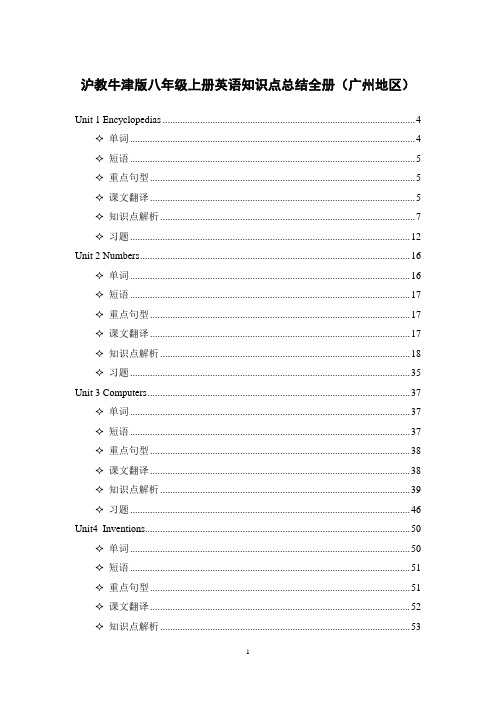
沪教牛津版八年级上册英语知识点总结全册(广州地区)Unit 1 Encyclopedias (4)✧ 单词 (4)✧ 短语 (5)✧ 重点句型 (5)✧ 课文翻译 (5)✧ 知识点解析 (7)✧ 习题 (12)Unit 2 Numbers (16)✧ 单词 (16)✧ 短语 (17)✧ 重点句型 (17)✧ 课文翻译 (17)✧ 知识点解析 (18)✧ 习题 (35)Unit 3 Computers (37)✧ 单词 (37)✧ 短语 (37)✧ 重点句型 (38)✧ 课文翻译 (38)✧ 知识点解析 (39)✧ 习题 (46)Unit4 Inventions (50)✧ 单词 (50)✧ 短语 (51)✧ 重点句型 (51)✧ 课文翻译 (52)✧ 知识点解析 (53)✧ 习题 (56)Unit5 Educational exchange (59)✧ 单词 (59)✧ 短语 (59)✧ 重点句型 (60)✧ 课文翻译 (61)✧ 知识点解析 (62)✧ 习题 (70)Unit 6 Ancient stories (73)✧ 单词 (73)✧ 短语 (74)✧ 重点句型 (74)✧ 课文翻译 (75)✧ 知识点解析 (76)✧ 习题 (81)Unit 7 Memory (86)✧ 单词 (86)✧ 短语 (87)✧ 重点句型 (88)✧ 课文翻译 (88)✧ 知识点解析 (89)✧ 习题 (96)Unit 8 English Week (100)✧ 单词 (100)✧ 短语 (101)✧ 重点句型 (101)✧ 课文翻译 (101)✧ 知识点解析 (103)✧ 习题 (107)每单元必考语法点预览Unit 1 some与any的用法& 复合不定代词somebody, anybody, nobody等的用法Unit 2基数词及数字的表达& 序数词Unit 3形容词的比较级与最高级Unit 4 good, bad, far & (not) as…as…Unit 5现在完成时& already, yet, ever, neverUnit 6 现在完成时中since, for & 现在完成时与一般过去时的区别Unit 7(真实性)条件状语从句& if…not 与unlessUnit 8情态动词should, had betterUnit 1 Encyclopedias 单词✧短语1.in the countryside 在乡村,在农村11.for example 例如2.human being 人12.next to 紧挨着3.die out 灭绝,消失13.look up 查阅4.find out 了解,弄清14.live on Earth 生活在地球上5.go for a walk 去散步15.an Italian painter 一位意大利画家6.be born 出生ed to do sth 过去常常做某事7.more than 多于,超过17.at the end of 在…末尾8.just like 正如,正像18.in the centre 在中心9.how long 多久e out of…从…出来10.would like 想要20.be famous for 以…而闻名✧重点句型1.Some dinosaurs were as small as chickens. 有的恐龙和鸡一样小。
牛津八年级上unit4语法练习(附答案和详解)

Unit 4 Do it yourself一.词汇运用1.You’d better(plant) some flowers in your yard.2.-I don’t know how to make cakes.-Maybe you need to read the i first.3.I can’t help(watch) the lovely pandas in the zoo.4.He is c about this computer game so he plays it every day.5.(repair) things is one of his (interest).6.I often advised him (not watch) TV all the day.7.He (pay) for the bicycle when his mother came in.st year, I spent two days a week (practice) playing the piano.9.(put) up the shelf on the wall.10.(study) harder and you will get success in the future.11.The pipe is f with dirty water.12.Every student stopped (pay) attention to their English teacher when she came in.13.Not only his parents but also he (like) travelling very much.14.He once tried (put) in a brighter light in his bedroom, but he made a mistake.15.I know much (many) about Chinese history than my cousin.16.The news sound (terrible).17.Please (not lose) heart. Everything will be fine in the end.18.We had better (not be) late for school.19.It is (useful) to me because I have got one before.20.Nothing is (possible). You shouldn’t give up your dream (easy). 二.单项选择1.It’s time .A.to have lunchB. to lunchC. for lunchD. A&C2.-You need to have a good rest now.-I wish I can. I can’t stop my homework because I have to hand in it tomorrow.A.finishB. to finishC. finishingD. finished3.This was our school’s anniversary(周年纪念)of establishment(成立)and I have attended anniversaries before.A.twenty; twentyB. twenty; twentiethC.twentieth;twentyD. twentieth;twentieth4.It took me half an hour all the task.A.finishedB. to finishC. finishingD. finish5.He the roses red, blue and pink and also cut out a picture of balloons.A.colours ; colourfulB. coloured;colourfulB.colourful;coloured D. coloured;colour6.The weather report that it is going to rain tomorrow.A.writesB. hasC. saysD. watches7.Next summer I will stay at home going outside.A.rather thanB. instead ofC. exceptD. instead8.He went to Sandy’s home to make a surprise for her.A.onceB. now thatC. orD.before 三.翻译句子1.我决定自己给妈妈做一个生日蛋糕。
牛津译林版八年级上册英语期末复习:各单元语法要点总结汇编

牛津译林版八年级上册英语期末复习:各单元语法要点总结汇编Unit1/unit2形容词、副词的比较级和最高级1、形容词、副词比较级和最高级词汇变化规则1)大多数短形容词(adj.)或副词(adv.)(单音节和少数双音节):直接加er est:long fast以e结尾的直接加r st:nice以“辅音字母+y”结尾的:去y+ier iest:easy以“一个元音+一个辅音字母”结尾的:双写辅音字母+er est (重读闭音节):big2)长形容词(两个以上):more+形/副most+形/副:important3) 不规则(死背)good/well :Bad/badly:many/much:little:far:2、形容词、副词比较级和最高级句型用法1)比较级:两者比较,“形容词或副词比较级+than”(根据上下文,than可以省略) E.g.Tom is much taller than Mary. (注意:much可以修饰比较级“......得多”)Tom runs faster than Mary.比较级正常没有the,特殊句型除外than后面主宾格问题:主语比较(且没有宾语),than后面没有谓语动词:主宾格都可(考试以学校老师的讲解为标准),但than后面出现谓语动词只能主格。
E.g. He is taller than she/her. He is taller than she is.He plays better than she/her.He plays better than she does.宾语比较只能宾格(试比较下面两句意思)E.g. He knows her better than I. 翻译He knows her better than me. 翻译2)最高级:三者及以上比较,the+最高级+(比较范围)可接序数词E.g. The building is the tallest in the country.The building is the second tallest in the country.注意in 和of的选择:E.g. She is the tallest of the three students.3、数量比较的四个形式多:more+名词+than, the most少:fewer/less+名词+than, the fewest/least这时不翻译成“更/最”,而要翻译成“更多或最多/更少或最少”注意比较差别:more students more beautiful4、同级比较(unit3)as...as “和......一样”否定:not as/so...as“不及,不如”=less+原级或反义词比较级+thanE.g. Mr Wu is as happy as the two girls.The two girls are not as tall as Mr Wu.=The two girls are shorter than Mr Wu. 根据形容词选择I think English is not so important as Chinese.=I think English is less important than Chinese.5、特殊用法1)固定句型形容词最高级前若有不定冠词a时,不表示比较,而表示“非常”之意:试比较下两句话:E.g. Spring is a best season.Spring is the best season.比较级+and+比较级(短)/more and more+原级(长)“越来越”E.g. better and better more and more beautiful(长单词不需要重复a.或adv.)两种情况同时变化“the+比较级,the+比较级”“越......越......”E.g. The older I get, the happier I feel.2)同义转换E.g. Li lei is the tallest student in his class.=Li lei is taller than any other student in his class.E.g. I think English is not so important as Chinese.=I think English is less important than Chinese.Less +a.原级+than仅用于长单词短单词要换反义词,见下E.g. The model bridge isn’t as tall as the real one.=The model bridge is shorter than the real one.Unit3 反身代词1、单词形式:注意单复数从我自己开始默写2、用法1)放动词或者介词后做宾语E.g. enjoy oneself do sth. by oneself2)做表语或同位语E.g. I am not myself today. 我今天不在状态The thing itself is not important.3)在不强调的情况下,but,except,for等介词后宾语用反身代词或人称代词宾格均可。
译林版牛津初中英语八年级上册全册各单元知识点整理归纳

译林版初中英语八年级上册全册各单元知识点归纳整理译林版初中英语八年级上册Unit 1 Friends重点短语:1.一个诚实的男孩 an honest boy2.一个八年级的学生 a Grade 8 student3.一次写作比赛 a writing competition4.一则……的广告 an advertisement for5.保密keep secrets6.使我开心make me happy7.分享我的快乐share my joy8.遇到麻烦be in trouble9.和我一样苗条as slim as me10.一个我最好的朋友one of my best friends11.对……慷慨be generous to12.乐意做某事be willing/ ready to do13.给需要的人让座give seats to people in need14.环游世界travel around the world15.使他看起来聪明make him look smart16.感到无聊feel bored17.讲滑稽的笑话tell funny jokes18.走过课桌walk past the desk19.撞翻我的书knock over my books20.想起我的好朋友think of my good friends21.看一则广告read an advertisement22.一位忠实的朋友an honest friend23.及肩的头发shoulder-length hair24.做大量的电脑工作do much computer work25.投票赞成某人vote for sb.26.帮助有需要的人help people in need27.课外活动after-school activities28.尽力帮助他们try to help them29.一名社会工作者 a social worker30.未来计划future plans31.看起来爱好运动look sporty32.搬迁到北京move to Beijng33.过来come over34.想念我的老同学miss my old classmates35.与……交朋友make friends with36.给我一些忠告give my some advice37.住在隔壁live next door38.邀请某人做某事invite sb to do39.她微笑的眼睛her smiling eyes40.面带微笑wear a smile on one’s face41.再来一些饮料some more drinks42.一些喝的something to drink43.任何时间at any time44.在将来in the future45.对……很了解know sth. very well46.一个人坐着sit alone47.认识某人get to know sb.48.不如not as… as49.在做某事上有困难have problems doing sth.50.在某事上有困难have problems with sth.51.适合某事be suitable for52.和某人分享某物share sth with sb53.对某人友好be friendly to sb54.十年前ten years ago55.解出数学题solve the maths problem56.写信给某人write to sb57.说某人的坏话say a bad word about sb58.相信他说的话believe what he said/ his words59.倾听人们的难题listen to people’s problems60.帮助人们解决难题help people solve their problems61.因为……而出名be famous for62.作为……而出名be famous as63.个像艾伦那样的朋友have a friend like Alan64.在午餐期间during lunch time65.同意做某事agree to do66.同意某人的意见agree with sb67.在左边的那个男孩the boy on the left68.跑步最快的人the fastest runner69.A和B都both A and B重点句型:1.冰箱里没有别的东西。
牛津版英语八年级上全册单元期末复习词汇与语法专项基础训练(含答案)
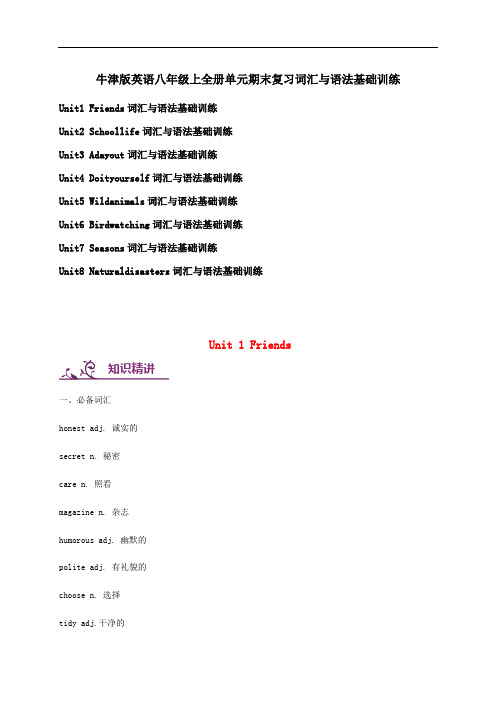
牛津版英语八年级上全册单元期末复习词汇与语法基础训练Unit1 Friends词汇与语法基础训练Unit2 Schoollife词汇与语法基础训练Unit3 Adayout词汇与语法基础训练Unit4 Doityourself词汇与语法基础训练Unit5 Wildanimals词汇与语法基础训练Unit6 Birdwatching词汇与语法基础训练Unit7 Seasons词汇与语法基础训练Unit8 Naturaldisasters词汇与语法基础训练一、必备词汇honest adj. 诚实的secret n. 秘密care n. 照看magazine n. 杂志humorous adj. 幽默的polite adj. 有礼貌的choose n. 选择tidy adj.干净的Unit 1 Friends知识精讲true adj.真实的trust v. 相信joke n. 玩笑sense n. 感知二、重点词汇1. honest adjective /ˈɒn.ɪst/telling the truth or able to be trusted and not likely to steal, cheat, or lie 诚实的;可信的1). She’s completely honest.她很诚实。
2). I’d like you to give me an honest answer/your honest opinion.我希望你给我一个诚实的回答/坦诚的意见。
2. care noun /keər/the process of protecting someone or something and providing what that person or thing needs保护;照看;照料1). The standard of care at our local hospital is excellent.我们当地医院的护理水平很出色。
八年级英语上册语法总结(Unit4-6)

第四单元语法重点:形容词和副词的最高级形容词和副词的最高级,当三个或三个以上的人或事物进行比较时,就需要使用形容词、副词的最高级,来表达最高、最远、最快等意义。
1.in 或 of 在句子中表示比较范围时,最高级就大显身手。
in表示“在……内”,意为在某范围内,不一定是同类;of表示“属性”。
例如:Sam is the tallest boy in our class.萨姆是我们班最高的男孩。
The girl is the most hard-working of all the students.这个女孩是学生中最勤奋的。
2.序数词后跟形容词最高级。
例如:This park is the second biggest in our city.这座公园是我们城市第二大公园。
3.“ one of the + 最高级 + 名词复数”的结构表示“(在众多当中)最……之一”。
例如:This tower is one of the oldest towers in our town.这座塔是我们镇上最古老的塔之一。
4.最高级的意思往往可以用比较级的形式表达出来。
“比较级 +than any other + 单数名词”可以表达最高级的含义。
例如:Mary sings more beautifully than any other student in our class.= Mary sings the most beautifully in our class.玛丽是我们班唱歌最好听的学生。
第五单元语法重点:动词不定式动词不定式的基本形式是 to do,其否定式是 not to do。
不定式可以充当多种句子成分,如主语、表语、宾语、定语、宾语补足语和状语等。
本单元的学习重点是动词不定式作宾语。
1.不定式作宾语有些及物动词常用动词不定式作宾语,如 want, hope, expect, wish, plan, learn, decide, choose, would like 等。
沪教牛津版8上U6单元练习 (答案)
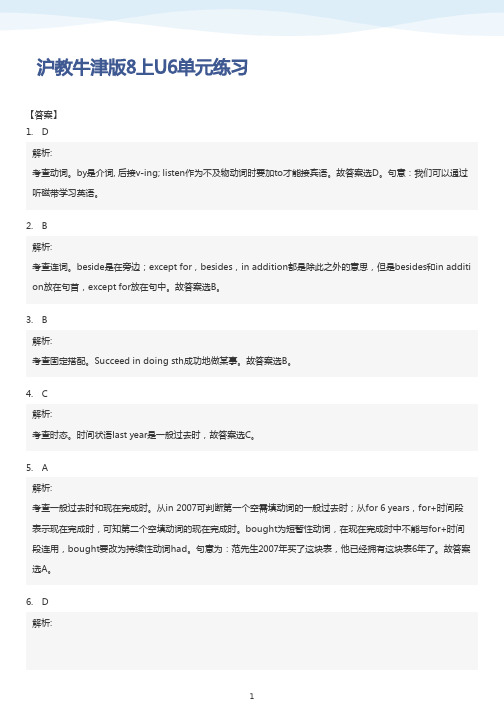
16. B 解析: 考查动词时态。第一句通过two hours ago可判断动作发生在过去,用一般过去时。 第二句通过for two hours 可判断应该用现在完成时,是过去发生的动作持续到现在,要用延续性动词。表示在某地待了多久用have/has b een in,由于后接here,故不用in。故选B。
r is the Night、The love of the last Tycoon。 ( 2 )选D,推理判断题。根据文中事情的发展顺序可知选D。 ( 3 )选C,推理判断题。根据文中可知,Fitzgerald后来嗜酒。 ( 4 )选D,推理判断题。本文主要讲的是Fitzgerrald的生平。
23.( 1 )B ( 2 )D ( 3 )C ( 4 )D ( 5 )A
3. B 解析: 考查固定搭配。Succeed in doing sth成功地做某事。故答案选B。
4. C 解析: 考查时态。时间状语last year是一般过去时,故答案选C。
5. A 解析: 考查一般过去时和现在完成时。从in 2007可判断第一个空需填动词的一般过去时;从for 6 years,for+时间段 表示现在完成时,可知第二个空填动词的现在完成时。bought为短暂性动词,在现在完成时中不能与for+时间 段连用,bought要改为持续性动词had。句意为:范先生2007年买了这块表,他已经拥有这块表6年了。故答案 选A。
牛津译林版八年级英语上册Unit4知识点练习.docx
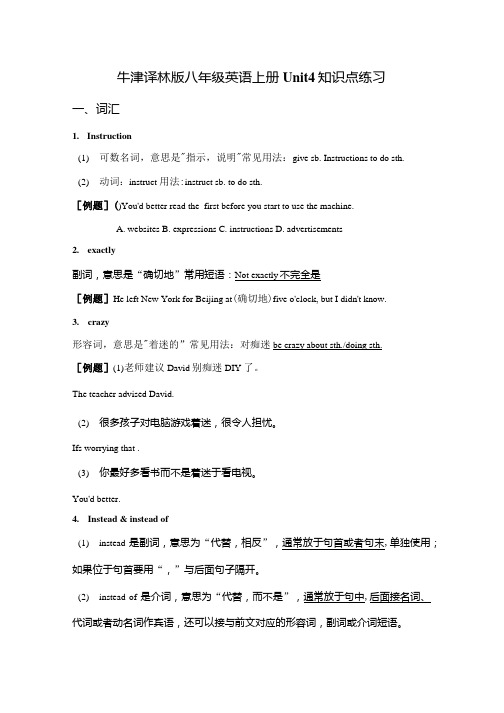
牛津译林版八年级英语上册Unit4知识点练习一、词汇1.Instruction(1)可数名词,意思是"指示,说明"常见用法:give sb. Instructions to do sth.(2)动词:instruct 用法:instruct sb. to do sth.[例题]()You'd better read the first before you start to use the machine.A. websitesB. expressionsC. instructionsD. advertisements2.exactly副词,意思是“确切地”常用短语:Not exactly不完全是[例题]He left New York for Beijing at(确切地)five o'clock, but I didn't know.3.crazy形容词,意思是"着迷的”常见用法:对痴迷be crazy about sth./doing sth.[例题](1)老师建议David别痴迷DIY 了。
The teacher advised David.(2)很多孩子对电脑游戏着迷,很令人担忧。
Ifs worrying that .(3)你最好多看书而不是着迷于看电视。
You'd better.4.Instead & instead of(1)instead是副词,意思为“代替,相反”,通常放于句首或者句末,单独使用;如果位于句首要用“,”与后面句子隔开。
(2)instead of是介词,意思为“代替,而不是”,通常放于句中,后面接名词、代词或者动名词作宾语,还可以接与前文对应的形容词,副词或介词短语。
[例题](1) Mr Green is ill today. Til go to the meeting instead .A.for himB.of himC.of heD.for he(2), Jack will the meeting tomorrow.A. Instead; attendB. Instead of; attendC. Instead; joinD. Instead of; join(3)你应该把你的零花钱用来买杂志,而不是用来买零食。
江苏牛津版8上英语4单元语法资料
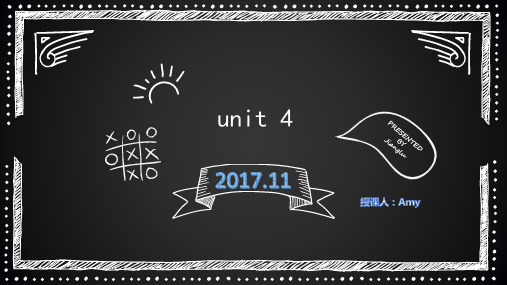
C.stop
D.leave
D
3.--Let's go hiking ___ staying at home,shall we?
--Good idea.
A.as well as B.in order to
C.instead of
D.in addition to C
4.--The box is too heavy to carry.What's in it?
A.wouldn't
B.shouldn't C.couldn't D.mightn't
B
练习上手
1.Tom,_____ afraid of speaking in front of people.You are the best one.
A.don't
B.not
C.not be
D.don't be
humorous
4.How __________(humour) Max is! He always tells us funny jokes.
speaking
5.All of us should spend as much time as we can __________(speak) English.
3.Sometimes miracles occur,but one has to work _______ for them.
A.terrible hardly
B.terriblly hard C.terriblly hardly
D.terribly hard D
4.Kate didn't want to have support.She just drank some water ______.
牛津译林版八年级英语上册Unit 4-6 单元练习题(含答案)
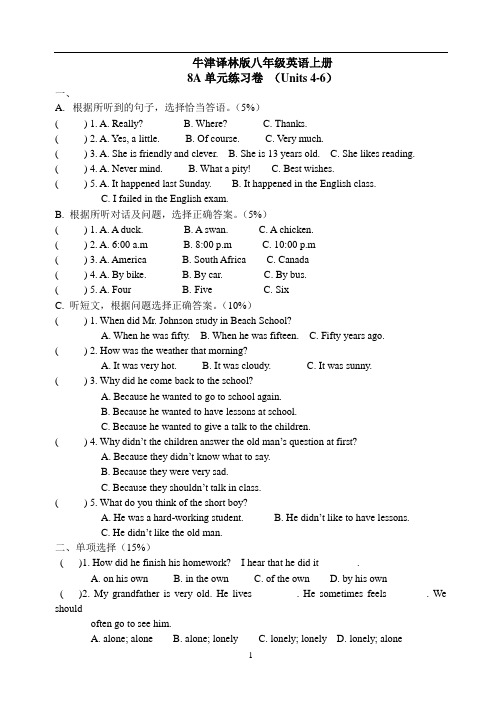
牛津译林版八年级英语上册8A单元练习卷(Units 4-6)一、A.根据所听到的句子,选择恰当答语。
(5%)( ) 1. A. Really? B. Where? C. Thanks.( ) 2. A. Yes, a little. B. Of course. C. V ery much.( ) 3. A. She is friendly and clever. B. She is 13 years old. C. She likes reading. ( ) 4. A. Never mind. B. What a pity! C. Best wishes.( ) 5. A. It happened last Sunday. B. It happened in the English class.C. I failed in the English exam.B. 根据所听对话及问题,选择正确答案。
(5%)( ) 1. A. A duck. B. A swan. C. A chicken.( ) 2. A. 6:00 a.m B. 8:00 p.m C. 10:00 p.m( ) 3. A. America B. South Africa C. Canada( ) 4. A. By bike. B. By car. C. By bus.( ) 5. A. Four B. Five C. SixC. 听短文,根据问题选择正确答案。
(10%)( ) 1. When did Mr. Johnson study in Beach School?A. When he was fifty.B. When he was fifteen.C. Fifty years ago.( ) 2. How was the weather that morning?A. It was very hot.B. It was cloudy.C. It was sunny.( ) 3. Why did he come back to the school?A. Because he wanted to go to school again.B. Because he wanted to have lessons at school.C. Because he wanted to give a talk to the children.( ) 4. Why didn’t the children answer the old man’s question at first?A. Because they didn’t know what to say.B. Because they were very sad.C. Because they shouldn’t talk in class.( ) 5. What do you think of the short boy?A. He was a hard-working student.B. He didn’t like to have lessons.C. He didn’t like the old man.二、单项选择(15%)( )1. How did he finish his homework? I hear that he did it _______.A. on his ownB. in the ownC. of the ownD. by his own( )2. My grandfather is very old. He lives ________. He sometimes feels _______. We shouldoften go to see him.A. alone; aloneB. alone; lonelyC. lonely; lonelyD. lonely; alone( )3. Some people in the mountains hunt wild animals _______ a living.A. atB. toC. withD. for( )4. They will walk _________the rainforest _______.A. through, after one or two weeksB. past, in one or two weeksC. through, in one or two weeksD. across, in a week or two( )5. The headmaster _______ the students to leave school early..A. madeB. letC. orderedD. had( )6. You will find _______ useful to learn even a little English.A. thatB. itC. thisD. they( )7. Which of the symbols means “per cent”?A. @B. $C. &D. %( )8. You felt unhappy yesterday,__________?A. didn’t youB. did youC. don’t youD. do you( )9. Shanghai is _____the east of China. Japan is ______the east of China.A. in, inB. at, onC. in, toD. at, to( )10. There ______ a large number of students in our school. The number of the students _______ over three thousand.A. is, isB. are, areC. is, areD. are, is( )11. I don’t know if Tom _________ here tomorrow. If he ________, I’ll tell you.A. comes, comesB. will come, comesC. comes, will comeD. will come, will come( )12. The teacher told me _________when I left the classroom.A. lock the doorB. to lock the doorC. to knock at the doorD. knock at the door( )13. When the students leave the classroom, they should walk out of the classroom _______.A. togetherB. in a hurryC. one by oneD. at the same time ( )14. The wetland can ________ food and shelter ______ plants and animals, including different kinds of birds.A. provide…forB. provide…withC. make…forD. provides…for ( )15. When I was working on a maths problem, a good idea went ______my head.A. overB. inC. aboutD. through三、句子填空(10%)一格一词1.令人遗憾的是,大熊猫在野外生存是很困难的。
- 1、下载文档前请自行甄别文档内容的完整性,平台不提供额外的编辑、内容补充、找答案等附加服务。
- 2、"仅部分预览"的文档,不可在线预览部分如存在完整性等问题,可反馈申请退款(可完整预览的文档不适用该条件!)。
- 3、如文档侵犯您的权益,请联系客服反馈,我们会尽快为您处理(人工客服工作时间:9:00-18:30)。
Unit 4(1)good,bad,far比较级和最高级(2) ( not) as…as的用法(not) as…as意思是“和……(不)一样……”,表示人或事物在某个方面程度(不)相当。
常见于以下结构中:1. (not) as+形容词原级+as…This advertisement is as funny as that one.逮个广告和那个一样有趣。
My mobile phone is not as expensive as yours.我的手机没有你的那么贵。
2 .(not) as many+可数名词复数+as…( not) as much+不可数名词+as…I have as many notebooks as my brother.我的笔记本跟哥哥的一样多。
注意:在否定句中,第一个as也可换成so,即not so…as….。
如:This new sofa is not so comfortable as the old one.这个新沙发不如旧的那个舒服。
Unit 51、现在完成时:主要强调过去发生的动作对现在造成的影响,或过去发生的动作还未结束,一直持续到现在或将来,重点在于对现在的影响。
这种考查难度较大,往往无时间状语,需要从上下文分析、推理才行。
(1)意义:①表示过去发生的动作对现在造成的影响或结果She has been ill for three days. (她病了三天了。
)②表示从过去某一时间开始一直持续到现在的动作或状态。
We've known each other since we were children. (我们从小就认识。
)I have been a member of the Party for 10 years.③常与现在完成时连用的时间状语有:just刚刚 yet 仍然,还 now 现在 lately 最后ever 曾经 today 今天 never 从未 before 从前recently 最近 already 已经 this week 本周 since 自从for a long tine 很长时间了 since then 自那以来so far 到目前为止 in the past/last few years 在过去/最近的几年(2)构成:”助动词have, has + 过去分词”【随堂练习】把下面变否定句、一般疑问句并作肯定和否定回答。
1. I have done my homework.否定句:_______________________________________一般疑问句:___________________________________回答:_________________________________________2. The plane has arrived.否定句:_______________________________________一般疑问句:___________________________________回答:_________________________________________2、动词的过去分词构成规则(1)规则变化①大部分动词在词尾直接加-ed: clean-- cleaned help-- helped②以不发音的e结尾的,直接加-d: like--liked live--lived③以辅音字母+y结尾的单词,变y为i再加edtry --tried study-- studied④重读闭音节词尾只有一个辅音字母的,需要双写最后这个辅音字母再加-ed.plan-- planned stop-- stopped(2)不规则变化: see--seen find--found【随堂练习】写出下列单词的过去分词形式work _________ finish __________ arrive___________change_________ see___________ have___________marry__________ visit__________ miss___________prefer__________ do___________ hear____________live____________ clean________ study___________meet___________ be __________ climb___________plan____________ take_________ stop____________keep____________ buy_________ spend____________learn___________ forget__________ bring____________3、现在完成时用法归纳(1) 现在完成时表示过去发生的动作现已完成,对现在造成的影响和结果。
(此种用法谓语动词用结束性动词)如:The plane has arrived.常用的时间状语和副词:already ,yet , ever , never①already 已经;yet 尚未,仍未,还;强调前不久完成的动作对现在造成的影响,谓语动词使用非延续性动词。
already 用于肯定句中,yet 用于否定句和疑问句的句末。
例如:I have already finished my homework. 我已经完成我的家庭作业了。
He hasn’t come yet.他还没有回来。
Has she finished cooking yet? 他做完饭了吗?练:I have already done my homework. (变为否定句)______________________________________________②ever (曾经),句中;never (从不),表示否定,强调到目前为止的生活经历。
谓语动词用延续性动词。
例如:Have you ever climb that mountain? 你曾经爬过那座山吗?Have you ever been to Shanghai?你曾经去过上海吗?I have never late for school.我从来没有迟到过。
③already ever与never应位于助动词have/has 之后,主要动词之前。
拓展:before (以前),句尾,独立用I haven’t met him before. 我以前从来没有见过他。
just (刚刚),用于肯定句中,常用在助动词和过去分词之间。
如:I have just heard the news. 我刚刚听到消息。
【跟踪训练】()1. Have you ______ heard of Disneyland?A. alwaysB. everC. neverD. sometimes()2. I have ________ finished my homework. So I can have a rest now.A. everB. alreadyC. neverD. yet()3. She is a good student, she has _______ been late for school.A. everB. alreadyC. neverD. yet()4. I am very hungry , I haven’t had my breakfast________.A. everB. alreadyC. neverD. yet4、at the weekend意为“在周末”,也可以说成at weekends.One of his very close friends visited him at the weekend.We will have a game of tennis at weekends.“在平时; 在工作日(周一至周五)”的说法是on weekdays.5、a bit of= a little “少量”, 后可接不可数名词。
I need a bit of time to think about it. There’s only a little bread left.a bit= a little “有点儿”,修饰形容词或副词。
It’s a bit (a little) cold today. You’d better put on your coat.6、one another “相互;互相” =each otherWe respect each other/one another.The sea and the sky seemed to melt into one another/each other.大海和蓝天似乎融为一体。
▲这两个短语均有所有格。
They know each other's/one another's weak points. 他们都了解彼此的缺点。
▲each other和one another是代词,在及物动词之后可直接用作宾语(如help eachother);而在不及物动词之后,则要借助介词(talk to each other, learn from one another等)。
另外,需注意这两个短语均不能用作主语。
7、come over to是come to的变化形式,强调有一定的距离,意为“从……到……”When did you first come over to the UK?Unit 61、现在完成时Since 和for 的用法表示过去已经开始持续到现在的动作或状态常用的时间状语有:for, since, how long, so far, these days等。
Since+过去点的时间,for+一段时间(数词+量词),一般用how long提问。
since短语或从句表示过去的动作延续至今,since之后的时间为一点。
如:for短语表示动作延续多长时间,for的宾语为时间段。
练习:用since和for填空1) ______ two years 2) _______ two years ago 3) _______ last month4) ______ 1999 5) _______ yesterday 6) _______ 4 o’clock7) ______ 4 hours 8) _______ an hour ago 9) _______ we were children10) _____ lunch time 11) ______ she left here2、现在完成时和一般过去时的区别现在完成时和一般过去时都表示在过去完成的动作。
